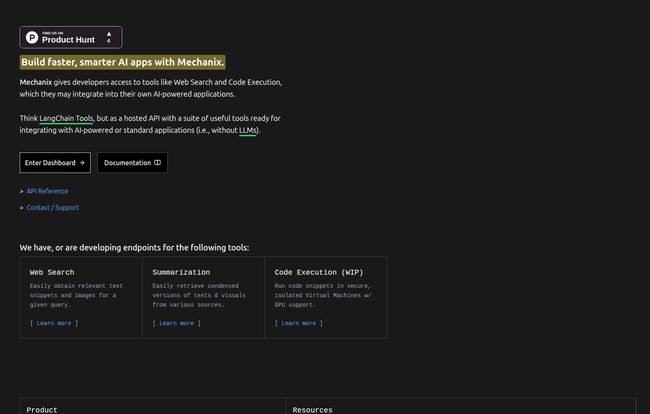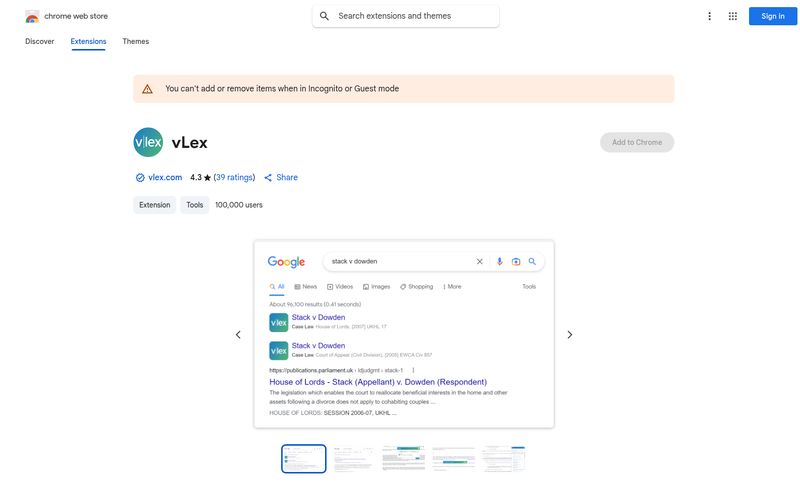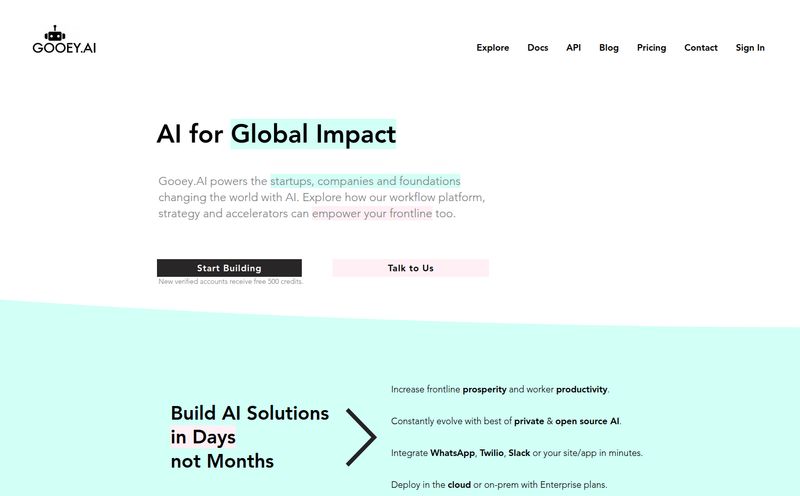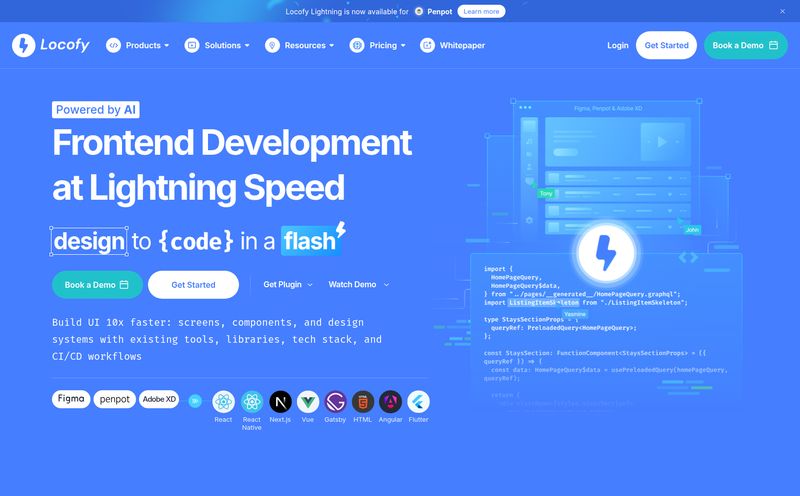Alright, let’s have a real chat. If you’re a developer, especially one who’s been swept up in the recent AI whirlwind, your life is probably a chaotic mix of API keys, Python environments, and a browser with way too many tabs open. I know mine is. We're all trying to build the next big thing, cobbling together large language models with other tools to give them real-world capabilities. It’s exciting! It’s also… a massive headache sometimes.
Every other week there’s a new framework or library that promises to make everything easier. Some are great, some are just noise. Then I stumbled upon Mechanix. The tagline on their site—which, by the way, has that cool, dark-mode aesthetic we all secretly love—is “Build faster, smarter AI apps.” Okay, you have my attention. But the line that really hooked me was this: “Think LangChain Tools, but as a hosted API.”
Now that is a statement. For anyone who's spent hours wrestling with setting up a web scraper or a secure code interpreter to work with their AI agent, that phrase is music to their ears. It suggests a world where you don't have to manage the messy backend infrastructure for these common tasks. You just… call an API. So, is Mechanix the real deal, or just another slick landing page? I decided to take a closer look.
So, What Exactly is Mechanix?
Let's break it down. Mechanix isn’t trying to be another all-encompassing AI framework. Instead, it’s positioned as a specialized toolkit. Imagine you’re building a custom car. You could forge every single wrench and screwdriver yourself, or you could just buy a high-quality, ready-to-use mechanic's set. Mechanix is that set of tools.
It provides developers with a suite of hosted APIs for common but complex functionalities that are often needed to augment applications, particularly those powered by AI. Instead of you running a web search service on your own server or building a secure sandbox for code execution, Mechanix handles it all. You just send a request to their endpoint, and you get the result back. Simple. This approach is brilliant because it lowers the barrier to entry for creating more powerful, world-aware applications.

Visit Mechanix
You can integrate these tools directly into your AI agent's thinking process (like giving a LangChain agent a Mechanix tool) or use them in a more traditional, non-AI application. Need to pull the latest headlines for your dashboard? The Web Search tool works for that too. This flexibility is a pretty big plus in my book.
The Tools in the Mechanix Toolbox
Right now, Mechanix is focused on a few core capabilities, with one big one on the horizon. Let's pop the hood and see what we’re working with.
Web Search on Demand
Giving an LLM access to the live internet is like giving a brilliant but book-smart academic a library card to the entire world. It’s a game-changer. The Mechanix Web Search tool lets you do just that. You can feed it a query, and it returns “relevant text snippets and images.”
This is more than just a simple Google search wrapper. The emphasis on returning condensed snippets is crucial for AI applications, as you don’t want to dump a whole 5,000-word article into a model's context window. You need the juicy bits. The addition of images is a nice touch, opening up possibilities for multimodal applications. I can already imagine an app that researches a topic and generates a report complete with relevant text and pictures. All through one API call. That’s pretty neat.
Summarization That Actually Works
This goes hand-in-hand with web search. Once you’ve fetched a bunch of information, you need to make sense of it. The Summarization tool is designed to “retrieve condensed versions of texts & visuals from various sources.” Again, the keyword here is condensed. In a world of information overload, a reliable summarization API is worth its weight in gold. I've seen so many projects where this is the main bottleneck. Getting it right is hard. Offloading that to a dedicated service like this could save a startup countless hours of R&D.
The Future: Secure Code Execution
Okay, this is the one that gets me genuinely excited. And also a little cautious. The Code Execution tool is listed as a Work In Progress (WIP), but it's the holy grail for creating truly autonomous AI agents. The description says it can “Run code snippets in secure, isolated Virtual Machines w/ GPU support.”
Let that sink in. Secure. Isolated. GPU support.
This is massive. It means you could build an agent that can not only write Python code to analyze data but actually run it to get a result. The GPU support opens the door for machine learning tasks, data visualization, and more. The security aspect is obviously the most critical part, and the promise of isolated VMs is the correct approach. If they nail this, it could become the default way for developers to give their AI creations a safe playground to perform tasks. It's a big 'if', but I'm optimistic.
Who is This Really For?
The primary audience is clear: developers in the AI space. If you're building with models from OpenAI, Cohere, or Anthropic and using frameworks like LangChain or LlamaIndex, Mechanix is speaking your language. It’s for the person who understands the power of chaining tools together but would rather focus on the application logic than on DevOps.
But I think the audience is broader. I’ve worked on plenty of “standard” web apps that could have benefited from an easy-to-use search or summarization API. Think internal knowledge bases, market intelligence platforms, or content aggregation sites. Mechanix seems to offer its tools a la carte, so you don't have to buy into the whole AI ecosystem to find value here. It's a smart move that widens their potential user base considerably.
Let's Talk About Pricing... Or Not
So, how much does this all cost? I clicked the “Pricing” link on their website with the same anticipation I have when waiting for code to compile. And… I was met with a page that says, “This page is in development.”
Classic. Can I really blame them? Not really. This is super common for new, developer-focused tools that are still finding their footing and gauging interest. It's frustrating as a potential user, but it's part of the process. I would much rather they take their time to figure out a fair pricing model than rush out with some confusing, expensive plan.
If I were to guess, we'll probably see a tiered subscription model. A free tier for hobbyists to experiment (maybe with limited API calls), and then paid tiers based on usage for businesses. A pay-as-you-go model for the Code Execution, perhaps billed by the second of compute time, would also make a lot of sense. For now, we'll just have to wait and see.
Mechanix vs. The DIY Approach
The eternal question for any developer tool: should I use this, or just build it myself? For something like a web search API, you could try to rig something up with Beautiful Soup and a proxy service. For code execution, you could get into a world of pain with Docker containers and sandboxing libraries. You absolutely can do it yourself.
But the real cost isn't just the initial development time. It's the maintenance. It's the security updates. It’s the server that goes down at 3 AM. It’s the search engine that blocks your scraper. Mechanix offers a trade: you trade a (presumably reasonable) subscription fee for your time and sanity. For a solo developer or a small team trying to move fast, that trade is almost always worth it. You get to focus on what makes your application unique, not on reinventing the infrastructure wheels.
Frequently Asked Questions
What is Mechanix in simple terms?
Mechanix is a service that gives your application superpowers through an API. It offers ready-made tools like web search, summarization, and soon, code execution, so you don't have to build them from scratch.
Is Mechanix a replacement for LangChain?
Not at all. It's more of a companion. LangChain is the framework for building the 'brain' of your AI agent, and Mechanix provides the 'hands'—the hosted tools that the brain can use to interact with the world or perform tasks.
How much does Mechanix cost?
As of this writing, the pricing details haven't been released. Their pricing page is currently in development. It's best to check their website for the most current information.
Is the Code Execution tool safe?
The architecture described—using secure, isolated Virtual Machines—is the industry-standard approach for safety. However, the feature is still a work in progress (WIP), so its final implementation will determine its robustness. It's a feature to approach with informed caution, as with any tool that executes code.
Can I use Mechanix tools without building an AI application?
Absolutely. The tools are offered as standard APIs. If your regular web or mobile app needs a powerful web search or text summarization feature, you can call the Mechanix API just like any other service.
My Final Take: A Very Promising Start
Look, the dev tool space is crowded. It's noisy. But Mechanix seems to have a clear vision that solves a real, tangible problem for a growing number of developers. The focus on providing complex tools as a simple, hosted API is the right move at the right time.
The current tools are solid, and the promise of a secure code execution engine is incredibly compelling. Yes, the lack of public pricing is a bit of a tease, and the most exciting feature is still on the way. But I'm choosing to be optimistic. Mechanix feels like a tool built by developers, for developers, who are tired of the boilerplate and just want to build cool stuff.
I'll be keeping a close eye on this one. Once that pricing page goes live and the code execution tool drops, Mechanix might just become an indispensable part of the modern AI developer's stack.
Reference and Sources
- The Official Mechanix Website: mechanix.tools
- Mechanix on Product Hunt: producthunt.com/posts/mechanix
- LangChain Documentation (for context on AI tools): langchain.com



